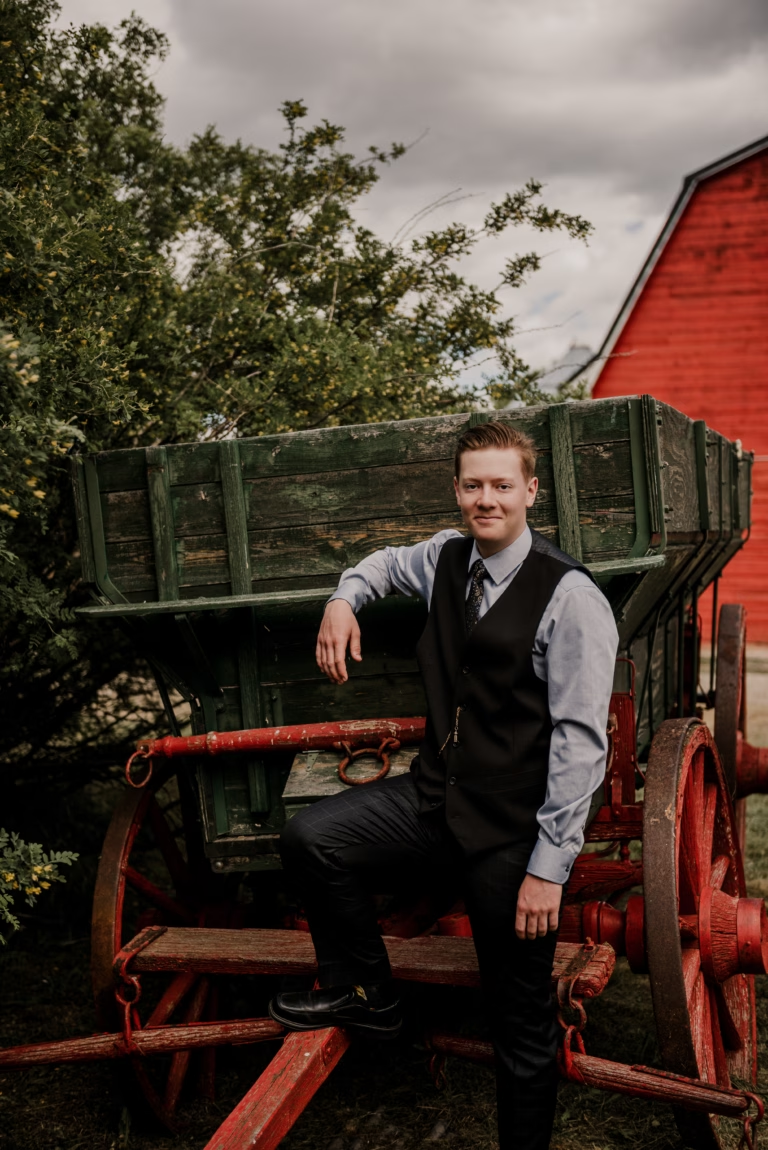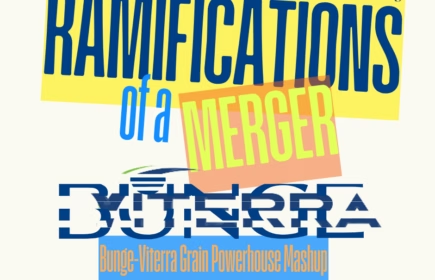The Grain Powerhouses: Bunge and Viterra
In the world grain trading game, four major players control 90% of the board, Archer Daniels Midland, Bunge, Cargill, and Louis Dreyfus, conveniently summarized as the ABCD Group. Bunge is a multibillion-dollar agribusiness, headquartered in St. Louis, Missouri, whose agricultural operations include import/exports, fertilizer manufacturing and distribution, food processing, and production. Bunge specializes in the handling and processing of American and South American oilseed crops like soybean, corn, canola, and sunflower.
Now, Bunge is looking to acquire another major grain trader, Viterra. Viterra was formed in 2007 when the Saskatchewan Wheat Pool acquired Agricore United (a combined organization of the Alberta and Manitoba Wheat Pools). Quickly, Viterra became one of the largest grain handlers in Western Canada, expanding its facilities to Australia and the US. Competing against Richardson, Cargill, G3, and AGT Foods. Viterra’s main focus is Western Canadian crops such as canola, mustard, wheat, barley, oats, pulses, etc. In 2012, Swiss commodity trading company, Glencore, acquired Viterra for $6.1 billion USD, but maintained the Viterra name and operation. Currently, Viterra is sitting on an acquisition offer of $8.1 billion USD from Bunge, awaiting approval from Transport Canada and the Canadian Bureau of Competition.
The Merger
When Bunge sent in their acquisition offer to Viterra in 2023, Transport Canada was informed, to which the Federal Minister of Transport declared a public interest assessment would be completed, along with a review by the Competition Bureau. The same process has been completed in all the other nations where both companies conduct business, and each jurisdiction has approved the transaction (the European Commission has allowed the merger as long as Bunge sells Viterra’s oilseed processing capacity in Hungary and Poland). Transport Canada has given its report to the Minister of Transport for review, while the Bureau of Competition has raised concerns, which Bunge and Viterra will address. Bunge also owns a 25% share in G3, another major Western Canadian grain handler. With Bunge’s acquisition of Viterra, they would control a major share of Canadian grain handling, especially in the Port of Vancouver.
Bunge’s main goal in acquiring Viterra is to expand its food processing and production capabilities to include Western Canadian crops and expand on Viterra’s already well-developed trading sector. Barring rejection from the Canadian federal agencies, Bunge’s acquisition of Viterra will lead them to become one of the world’s largest agribusinesses, with a large diversification of their products and commodities, and an entrance into the Canadian agriculture market.
The Power of a Monopoly
If or when the merger of these two firms takes place, 125 oilseed crushing and refining plants, with 75 million tonnes of crushing capacity, and 55 port terminals will be under Bunge’s control. Not to mention, over 350 storage facilities and over 230 million tonnes of marketed commodities and products, will also be under Bunge’s portfolio after they acquire Viterra (numbers exclude G3’s). However, these are global numbers; and the main concern currently lays around Canada’s Port of Vancouver as well as Viterra’s canola crushing plants, and overall grain handling, economics, and prices. These concerns raise the question, will Bunge be a monopoly power in Canada?
The Port of Vancouver
Canadian agriculture is export-focused, where about $29 billion worth of crops are exported to different countries, and about 75% of this trade flows through Canada’s biggest port in Vancouver. In a research paper written by University of Saskatchewan Professors Gray, Nolan, and Slade, it was found that about 50% of the grain terminals in Vancouver would be controlled by Bunge (including G3, which controls the largest terminal). With a major hold on the port, we could see an increase in grain export prices, reduced producer prices, and a decrease in grain producer revenue by about $570 million per year. All of which doesn’t seem to be overly beneficial for Western Canadian grain and oilseed producers.
Viterra’s Canola Crushing Facility in Regina
Construction began on the world’s largest canola-crushing plant in Regina back in 2021, with Viterra’s plans to be operational in late 2024. When the plant is up and running, Richardson, Cargill, and Bunge will seek to compete with the world’s largest crush plant for canola to crush. Increased competition is good for producers, as prices for their commodities increase. However, with Bunge controlling Viterra’s assets, there is a chance of the cancelling of the new crush plant, and competition will decrease greatly, with prices lowering, and a loss of producer income of about $250 million per year.
Grain Handling, Commodity Prices, and Economics
Without Viterra in the market, competition between grain handlers will drop significantly. In Canada, Bunge will control a large share of the agriculture market, and essentially becoming a monopoly. In many areas, the number of different grain elevators will decrease, lowering competition, and causing producers to look elsewhere for competitive pricing (or taking the lower price). This could also cause an increase in producer’s trucking costs if they have to travel far, if elevators close down, or the price difference is drastic enough. This reduction in price is estimated to reduce producer income by another $75 to $150 million per year, according to the USask report.
Economically speaking, the current agricultural market is characterized as an oligopoly, where a small number of large companies control the market. With the merger, the market will remain an oligopoly, but Bunge will take an even bigger slice of the pie, creating in a sense, a monopoly. With monopolies, they can choose what to do, as the producers don’t have much of a choice. As shown in the graph, monopolies will produce (in our case, purchase grain) at a lower rate, but charge higher prices (in our case, lower prices), shown at Point G, rather than produce at the equilibrium where everyone is happy. With this, deadweight loss is created. Deadweight loss is an inefficiency in the market, where (usually) consumer surplus (benefits to consumers) decreases, and is gained by the monopoly. In estimates from the University of Saskatchewan, the deadweight loss created by the merger is about $105 million per year.
Conclusions and Solutions
The Bunge-Viterra merger is a good investment in the eyes of Bunge. As they are currently not a major player in the Canadian ag industry, and their focus is on American and South American crops. Canadian agriculture offers a unique portfolio of exports compared to south of the border where they currently operate. Acquiring Viterra greatly diversifies their assets and sets them up for major export and processing operations with Canadian crops. If Bunge decides to further expand with Viterra’s assets, this can create several jobs in construction and operating the processing and production plants.
However, this merger is a major concern for the ag industry and grain producers. The merger will cause Bunge to control a majority of the grain aspect of Canada’s biggest port, greatly expand their oilseed processing capabilities, and create a monopoly for producers, and Richardson, Cargill, and the ABCD Group (minus B) to compete against. Not to mention the eventual acquisition of G3. To sum it up, approximately $1 billion in reduced income per year to grain producers will come from the Bunge-Viterra merger.
So, what solutions are there? As previously mentioned, a public interest review is currently underway by the Ministry of Transport and the Bureau of Competition. While this has been underway since last year, many agricultural groups have sent in numerous reports, letters, and concerns to different levels of government, including the provincial ag minister, the federal government, and the federal agencies reviewing the merger. The proposed policy solution is for the Ministry of Transport to reject the merger outright. As explained previously, the numerous negative effects that the merger will have on the ag industry will be and are extremely detrimental to all aspects of the industry, whether transportation and shipping, grain production, or food processing and production. Small stipulations that the Ministry of Transport may put in place, such as the European Commission’s, do not make a difference in the overall effects that this merger has on the industry. In conclusion, the best choice for policy makers is to reject the Bunge-Viterra merger, and have competition remain in the market.
Bunge. (2023). Bunge + Viterra Creating a Premier Agribusiness Solutions Company. https://investors.bunge.com/~/media/Files/B/Bunge-IR/documents/events-and-presentation/2023/final-investor-presentation-bunge-viterra-6-13-23.pdf
Creative Commons. (2012, December 29). Assessing Monopoly. 2012books.lardbucket.org. https://2012books.lardbucket.org/books/microeconomics-principles-v2.0/s13-03-assessing-monopoly.html#rittenberg-ch10_s04_s01_s01_f01
European Commission. (2024, July 31). Commission clears Bunge’s acquisition of Viterra subject to conditions. European Commission. https://ec.europa.eu/commission/presscorner/detail/en/ip_24_4103
FCC. (n.d.). Understanding agriculture and food trade: An overview | FCC. Www.fcc-Fac.ca. Retrieved April 7, 2024, from https://www.fcc-fac.ca/en/knowledge/economics/understanding-trade-overview#:~:text=Overall%2C%20AAFS%20estimates%20that%20over
Government of Canada. (2023, July 6). Overview of Canada’s Agriculture and agri-food Sector. Government of Canada. https://agriculture.canada.ca/en/sector/overview
Grey, R., Nolan, J., & Slade, P. (2024). The Economic Impact of the Proposed Bunge-Viterra (BV) Merger on the Grain Sector in Western Canada: A Preliminary Assessment. https://saskbarley.com/wp-content/uploads/2024/04/Preliminary-Assessment-BV-Merger-USASK-FINAL-Report-for-Release.pdf
Heppler, K. (2023, October 5). Ag groups urge Saskatchewan government to review Bunge-Viterra merger. RealAgriculture.com. https://www.realagriculture.com/2023/10/ag-groups-urge-saskatchewan-government-to-review-bunge-viterra-merger/
Holtslander, C. (2023, July 13). Feds should step up and buy Viterra. The Western Producer. https://www.producer.com/opinion/feds-should-step-up-and-buy-viterra/
Pratt, S. (2023, October 5). Transport Canada to review Bunge-Viterra port impacts. The Western Producer. https://www.producer.com/news/transport-canada-to-review-bunge-viterra-port-impacts/
Pratt, S. (2024, August 15). Bunge waits for merger decision | The Western Producer. The Western Producer. https://www.producer.com/news/bunge-waits-for-merger-decision/
Stephenson, A. (2023, June 13). Bunge and Viterra sign merger agreement to create global agribusiness giant. Western Investor. https://www.westerninvestor.com/british-columbia/bunge-and-viterra-sign-merger-agreement-to-create-global-agribusiness-giant-7135764
Transport Canada. (2023, September 26). Statement by Transport Minister Rodriguez on the proposed acquisition of Viterra Limited by Bunge Limited. Www.canada.ca. https://www.canada.ca/en/transport-canada/news/2023/09/statement-by-transport-minister-rodriguez-on-the-proposed-acquisition-of-viterra-limited-by-bunge-limited.html
Transport Canada. (2023, October 23). Let’s Talk Transportation: Public Interest Assessment of Bunge’s Proposed Acquisition of Viterra. ACFP 19863890. https://tc.canada.ca/en/corporate-services/consultations/let-s-talk-transportation-public-interest-assessment-bunge-s-proposed-acquisition-viterra
WBMI Authors. (2023, March 29). The ABCD agro-giants: hidden movers in biobased scaling. World Bio Market Insights. https://worldbiomarketinsights.com/the-abcd-agro-giants-hidden-movers-in-biobased-scaling/#:~:text=Archer%20Daniels%2C%20Bunge%2C%20Cargills%2C
Wikipedia Contributors. (2023, December 24). Viterra. Wikipedia. https://en.wikipedia.org/wiki/Viterra
Wikipedia Contributors. (2024, January 28). Bunge Global. Wikipedia. https://en.wikipedia.org/wiki/Bunge_Global
Young, R. (2023, October 6). Four Agriculture Groups want review of Bunge-Viterra merger done by the provincial government. 620 CKRM. https://www.620ckrm.com/2023/10/06/four-agriculture-groups-want-review-of-bunge-viterra-merger-done-by-the-provincial-government/

Avery Hodgins
My name is Avery Hodgins, and I am in my third year of my Agribusiness degree. I grew up on a grain farm, just outside of Kyle, Saskatchewan, where we grow durum wheat, lentils, and canola. My summers are spent working on the farm with my dad, as well as renting my own land. Growing up, I have always had a love for agriculture, and my time at university has only increased that passion. The University of Saskatchewan has provided me with great opportunities to advance my career in the industry, whether through clubs, coursework, or experiences. I hope to follow up my Bachelor’s degree with a Master’s in Agricultural Economics, to further my learning and love for agriculture.



We couldn’t agree more with the conclusion to reject the Bunge-Viterra merger. We are grain producers in saskatchewan and feel the merger will unfairly affect our operation. unfortunately, the media recently announced the merger was going ahead.
It is great to see these young “university farmers” taking such great interest in the future of their farming operation and how these mergers can affect Economics, current markets, and pieces of the pie! thank you to this writer, named Avery hodgins!